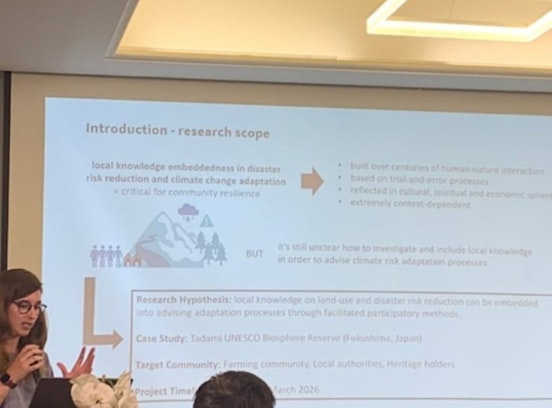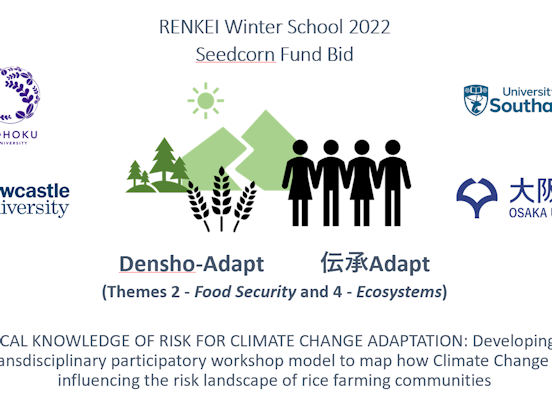Densho-Adapt
Densho-Adapt: Developing a transdisciplinary participatory workshop model to map local processes to adapt to climate change related risks in Japan
- Deutsch
- English
- Italiano
- Project duration: -
- Project status: finished
- Funding: Stiftungen (Other projects /Project)
- Institute: Center for Global Mountain Safeguard Research
There is growing awareness that local knowledge embeddedness in disaster risk reduction and climate risk adaptation processes is critical for the achievement of community resilience to climate related risks. Communities living in hazard-prone areas, and who have a long history of being exposed to frequent hazards throughout the years, are likely to develop significant knowledge of their risk landscape. This knowledge is reflected in the social, cultural, spiritual, and even political and economic spheres, leading to the development of norms and practices on how to deal with hazards, adapting to changes through continuous processes of trial and error.
Nevertheless, great uncertainties persist concerning the methods of investigation and inclusion of local knowledge as a tool to understand and advise climate risk adaptation processes. The Densho-Adapt project investigates the link between local knowledge in a mountain community in Japan’s Fukushima prefecture, and their adopted disaster risk reduction and land management practices, inquiring on their significance in face of rising climate change related risks. This project unfolds through inter- and transdisciplinary approaches involving the rice farming, resident community and local authorities of Tadami UNESCO Biosphere Reserve, located in a mountainous area of Japan’s Fukushima prefecture.
The Densho-Adapt project is led by GLOMOS's Programme Associate and Tohoku University PhD candidate Paola Fontanella Pisa, and is supported by colleagues from Newcastle University UK (contributing with participatory methodological approaches), Southampton University (contributing with spatial analysis of high-quality satellite data and projections of past climate changes) and Osaka University ( with water and soil analysis).
In order to incorporate communities’ experience, perspectives and expertise, this project unfolds through transdisciplinary participatory methods interacting with both social and natural sciences. The research project objectives are namely: 1) to have an overview on long term environmental and climate changes in the case study area; 2) to co-construct understandings of the implications of these changes for the community; 3) to have an overview on adopted adaptation measures to reduce risks based on community experience. In addition, the project aims to 4) develop a participatory workshop model to reach the previously listed objectives.
The Densho-Adapt project foresees four main steps:
- Stage 1: literature review and getting to know the field
- Stage 2: Data acquisition through participant observation and participatory workshops
- Stage 3: Result analysis and definition of co-created narratives
- Stage 4: Final workshop and result validation with community
Fontanella Pisa P, Underhill H, Ascencio Damian J, Sengupta D (2023)
Presentation/Speech
Conference: RENKEI Closing Conference | online | 18.9.2023 - 18.9.2023
Fontanella Pisa P (2023)
Presentation/Speech
Conference: First Workshop of the UNESCO World Network of Mountain Biosphere Reserves | Dujiangyan | 18.9.2023 - 22.9.2023

